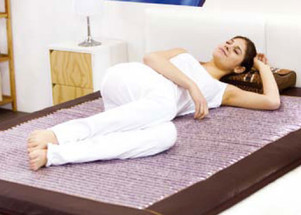Posted by Richway and Fuji Bio on 15th Apr 2023
Measuring Pain and Stress Reduction Using the Infrared and Negative Ion Amethyst Biomat
ABSTRACT
Background
Twelve subjects were tested before and after using the Biomat for 1 hour daily over a 3-month period, using 3 different biofeedback devices and blood cortisol levels to measure stress reduction. Far infrared, negative ion, and amethyst Biomats reduce stress by 78%, as validated by pre- and post-biofeedback brain scans, as well as a fasting blood test to measure the stress hormone cortisol. The core of the Biomat technology is a combination of far infrared rays, negative ion effects and the conductive properties of amethyst channels. These powerful health stimulators are combined into a single, easy-to-use product with remarkable healing properties. The Biomat delivers soothing, deep-penetrating heat, while stimulating the regeneration of damaged cells in the body. It is a safe and natural way to achieve optimal health now, and maintain a stronger, more resilient body in the future. This effective therapy is now available to medical professionals and home consumers who want to improve their health and wellbeing. Based on Nobel prize-winning scientific research pioneered by the National Aeronautics and Space Administration (NASA) and developed using pure, natural materials, the Biomat is an approved medical device by the Food and Drug Administration (FDA)
Objectives of the study
Examine the key benefits of the infrared, negative ion, and amethyst Biomat for reducing stress and fatigue, relieving anxiety and promoting relaxation, improving sleep patterns, reducing inflammation, easing joint pain and stiffness, and eliminating toxins from the body.
Subject selection criteria
Twelve healthy subjects with mild to moderate stress levels were selected to participate in this case study, with their informed consent. Subjects with medical or psychiatric conditions, and those taking heavy medication were excluded from the study. Subjects were tested weekly using biofeedback devices before and after using the Biomat, and blood tests to measure cortisol levels were obtained from each subject before and after the 3-month period of the case study.
Methods
Twelve subjects were tested weekly before and after using the Biomat for over 2 months, using the internal capsule (ICAP) brain scan, heart rate variability (HRV) scan, and the magnetic resonance bioanalyzer. The results showed a stress reduction by 78% among subjects tested and an increased sense of wellbeing. All 12 subjects were tested in Toronto, Ontario, Canada. The psychometric properties of the Depression Anxiety Stress Scale (DASS) were evaluated in a normal sample (n=12), who were also assessed using the Beck Depression Inventory (BDI) and the Beck Anxiety Inventory (BAI). The DASS was shown to possess satisfactory psychometric properties, and the factor structure was substantiated both by exploratory and confirmatory factor analysis. In comparison to the BDI and BAI, the DASS showed a greater separation in factor loadings. The DASS anxiety scale had a 0.81 correlation with the BAI, and the DASS depression scale showed a 0.74 correlation with the BDI. Factor analysis suggested that the primary difference between the BDI and the DASS depression scale is that the BDI includes items such as weight loss, insomnia, somatic preoccupation, and irritability, which fails to discriminate between depression and other affective states. The factor structure of the combined BDI and BAI items was virtually identical to that reported by Beck for a sample of diagnosed depressed and anxious patients, supporting the view that these clinical states are more severe expressions of the same states that may be discerned in 'normals'. The results’ implications on the conceptualization of depression, anxiety, and tension/ stress are considered, and the utility of the DASS scales in discriminating among these constructs are discussed.
AUTHOR: DR. GEORGE GRANT, Ph.D, I.M.D., M.Sc., M.Ed., C.CHEM., R.M. AFFILIATION: Currently in private practice at Champion Integrative Clinic, Toronto, ON Canada. Former Consultant for Health Canada, Ottawa, ON, Professor at Seneca College, North York, ON


